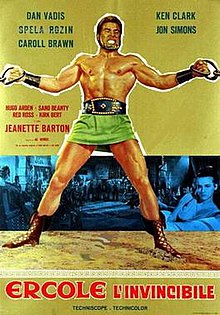| This article needs additional citations for verification. Please help improve this article by adding citations to reliable sources. Unsourced material may be challenged and removed. Find sources: "Hercules the Invincible" – news · newspapers · books · scholar · JSTOR (June 2019) (Learn how and when to remove this message) |
| Hercules the Invincible | |
|---|---|
 | |
| Directed by | Alvaro Mancori Lewis Mann |
| Written by | Pat Kein (writer) Alvaro Mancori (screenplay) Kirk Mayer (writer) |
| Produced by | Alvaro Mancori |
| Starring | Dan Vadis, Spela Rozin |
| Cinematography | Claude Haroy |
| Edited by | Frank Robertson |
| Music by | Francesco De Masi |
| Release date |
|
| Running time | 85 minutes |
| Country | Italy |
| Language | Italian |
Hercules the Invincible (Italian: Ercole l'invincibile) is a 1964 Italian Sword and Sandal film directed by Alvaro Mancori and Lewis Mann and starring Dan Vadis. It is the first of two directing credits for cinematographer Alvaro Mancori.
The film was later released to American television retitled Son of Hercules in the Land of Darkness as part of the Sons of Hercules TV syndication package.
Plot
Hercules saves a woman named Telca from a lion and arrives in triumph in her village. Telca's father King Tedaeo offers Hercules Telca's hand in marriage, if he brings back the tooth of a dragon. Hercules seeks help from a witch who gives him a spear that will kill the dragon but wants the same tooth as her reward. As Hercules has promised the tooth to King Tedaeo the witch warns him that the magic of the tooth will only work once.
In Hercules' absence Telca's village has been pillaged and all the survivors –save Babar, the comedy relief – are taken as prisoners to the Demulus, a tribe that lives inside a mountain and eats the hearts of their prisoners.
Cast
- Dan Vadis as Ercole (Argolese)
- Spela Rozin as Telca
- Carla Calò as Ella, Queen of the Demulus
- Ken Clark as Kabol, Melissia's Father
- Jon Simons as Babar
- Maria Fiore (billed as Jannette Barton) as Etel
- Ugo Sasso as King Tedaeo, Telca's Father
- Howard Ross as Telca's Brother
- Olga Solbelli as The Oracle
- Alberto Cevenini as Capt. of the Guard
- Rosemarie Lindt as Slave Girl
- Kriss Moss as Guard
- Jannette Le Roy as Slave Girl
- Sara Laurier as Slave Girl
- Christine Mathius as Slave Girl
Reception
From contemporary reviews, an anonymous review in The Monthly Film Bulletin noted that "the sloth-like hero belongs to the more dim-witted school of muscle-men, so that it takes a companion, in the shape of a comically cowardly assistant to demonstrate by contrast the heroic stature of Hercules." The review noted "there is some modestly colourful spectacle in the scenes of the underground city and its destruction by lava."
References
- ^ "Ercole L'Invincible (Hercules the Invincible), Italy, 1963". Monthly Film Bulletin. Vol. 32, no. 372. British Film Institute. January 1965. p. 7.
External links
- Hercules the Invincible at IMDb
- Hercules the Invincible is available for free viewing and download at the Internet Archive (dubbed in English)
This article related to an Italian film of the 1960s is a stub. You can help Misplaced Pages by expanding it. |
This article about a fantasy film is a stub. You can help Misplaced Pages by expanding it. |